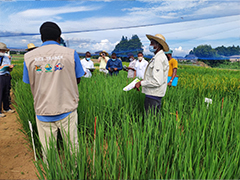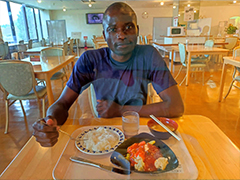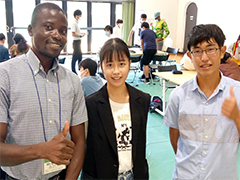Rice cultivation training in Japan - Message from a Zambian participant (2022-09-06)
I am Derick Mumba from Zambia. I am Technical Research Assistant Officer at Mansa Research Station under the Zambia Agricultural Research Institute (ZARI), and currently participating in a JICA's 7-month-long training program in Japan, "Rainfed Rice Cultivation, Seed Production and Variety Selection Techniques".
My organization, ZARI, is the national and largest agricultural research entity in Zambia with a total of 10 research stations. The overall objective of ZARI is to develop and adapt crop, soil and plant protection technologies in order to increase the agricultural productivity and diversify the production. For this objective, our missions include providing a high-quality, appropriate and cost-effective services to farmers. In line with this objective and missions, and as a ZARI's staff working with the Market Oriented Rice Development project (MOReDeP), I am learning through this rice cultivation training with an aim to disseminate the acquired knowledge to farmers back in Zambia after the completion.
Through this training, I am learning better cultivation, seed production, and variety selection focusing on the research. Additionally, I have taken a course on research ethics with an emphasis on the importance of adhering to ethical norms in research including public accountability and support, truth and avoidance of error. Also, I am conducting a field study at the experimental fields of JICA's Tsukuba International Center. The objective of the study is to determine the effect of seeding density on the yield of upland New Rice for Africa (NERICA). I am enjoying the training as it provides me an opportunity to not only learn and practice emerging technologies on upland rice cultivation but also network with professionals from Japan and many other countries.
My life in Japan has not been all smooth. For example, the difference in food was one of the challenges. While rice is a staple food in Japan, Maize is our staple food in my country (Zambia). But, with the passage of time, I got used to the Japanese food. Now, I like sticky rice which most Japanese like, and Miso soup is one of my favorites. The Japanese community is warm and welcoming. I have adapted quickly and am enjoying every single day now. There are four seasons in Japan: spring, summer, fall and winter. Each season has specific experiences to offer, and for each season, there are many different ways to enjoy places in Japan. I am impressed by the working culture and the time management of the Japanese, which have been and keep impacting me positively through our daily activities of the training.
The training will continue till the mid-November. But, I cannot wait to share the knowledge and skills I learned and my experiences in Japan with farmers and other experts in my field of work back in Zambia and improve the quality and quantity of agricultural productivity and diversity in Zambia.

Field study at the experimental fields

Japanese food I like eating almost on daily bases

Interaction with Japanese
